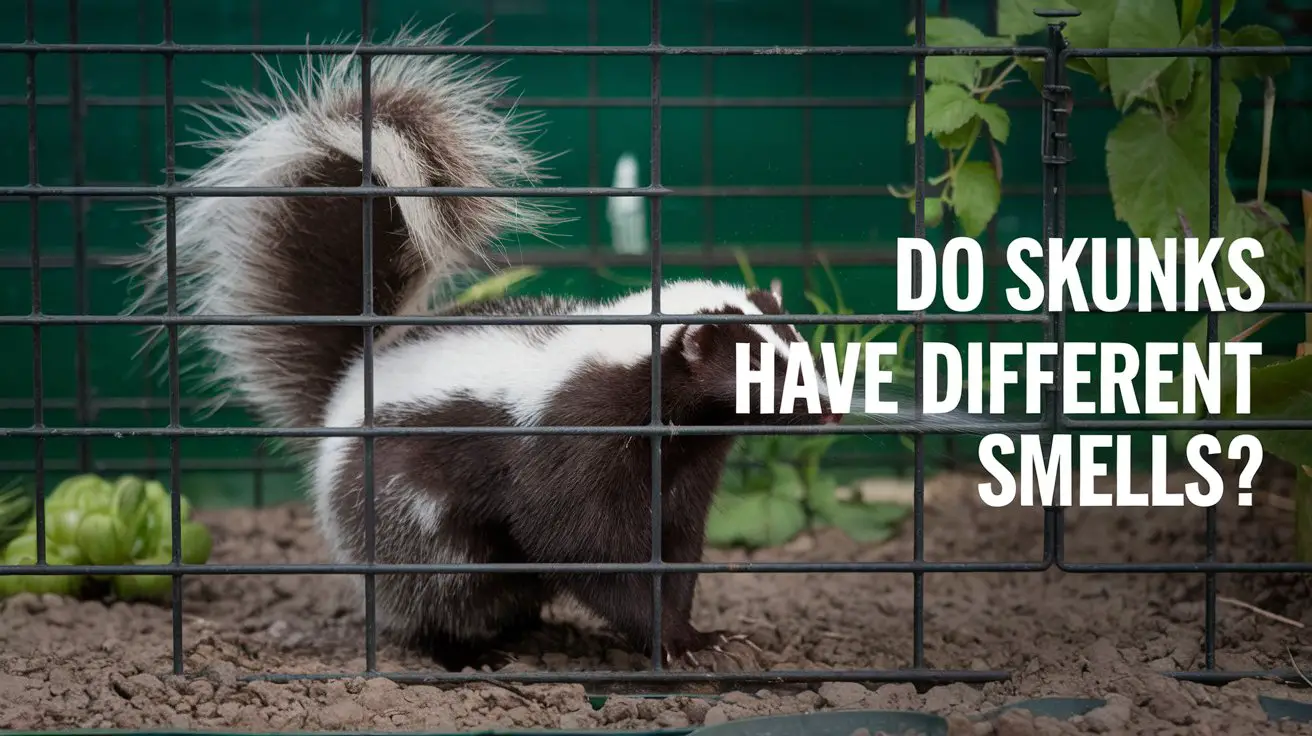Do Skunks Have Different Smells?
Last updated on June 15th, 2025 at 11:48 pm
Yes, skunks can have different smells depending on species, age, diet, and even stress level. The infamous skunk spray—while always unpleasant—can range from burnt rubber and garlic to rotten eggs or sulfur, depending on the individual skunk and how recently it sprayed.
As someone who studies skunks and owns several, I can confirm: not all skunk odors are created equal—and yes, baby skunks do smell slightly different from adults.
What Causes Skunk Spray to Smell?
Skunks are equipped with scent glands near their tails, which produce a pungent liquid primarily composed of sulfur-containing chemicals called thiols. These chemicals are responsible for the spray’s infamous odor. Skunks use this spray as a defense mechanism against predators, and its strong smell is highly effective at deterring threats.
Key Components of Skunk Spray
- Thiols: These sulfur-based compounds are the primary contributors to the rotten-egg smell.
- Thioacetates: These are secondary compounds that react with moisture to release an odor over time, making the smell persist.
Do Skunks Have Different Smells?
Yes, skunks can produce sprays with slightly different smells. While the base odor is universally unpleasant, variations can occur due to several factors, including the species of skunk, diet, health, and environmental conditions.
1. Differences Among Skunk Species
Skunks belong to several species, and each has unique scent profiles:
- Striped Skunk (Mephitis mephitis): Common in North America, this skunk’s spray is often described as the strongest and most pungent.
- Spotted Skunk (Spilogale putorius): Their spray is slightly sweeter and less overpowering, though still unpleasant.
- Hooded Skunk (Mephitis macroura): Native to Central America, their spray has a muskier undertone.
Each species has evolved its unique chemical signature, tailored to their environment and predators.
2. Diet and Its Role in Odor Variations
Skunks are omnivores, and their diet directly impacts the composition of their spray.
- Protein-Rich Diets: A diet heavy in meat or insects may intensify the sulfuric quality of the spray.
- Fruits and Vegetables: Diets higher in plant matter can produce a slightly less offensive odor, although the difference is subtle.
As a skunk owner, I’ve noticed that diet also influences the general smell of pet skunks, not just their spray.
3. Health and Hormonal Factors
The health and hormonal state of a skunk can influence its scent:
- Illness or Infection: A sick skunk may produce a weaker or altered spray due to changes in gland function.
- Mating Season: During mating season, skunks release additional pheromones, which can mix with their spray and create a more complex odor profile.
If you have a pet skunk, regular vet checkups can ensure that their glands and overall health are in good condition.
4. Age and Maturity
Younger skunks tend to have a less potent spray compared to adults. This is because their scent glands are not fully developed until they reach maturity. Adult skunks, particularly during stressful situations, release the strongest and most distinct odors.
How Humans Perceive Skunk Odors Differently
Interestingly, humans may perceive skunk smells differently based on their sensitivity to sulfur compounds and environmental factors:
- Location and Weather: In humid conditions, skunk spray can smell stronger due to the activation of thioacetates.
- Distance from the Source: Closer proximity to the skunk will reveal more of the spray’s distinct layers, such as the musky undertones.
- Individual Sensitivity: Some individuals are more sensitive to thiols and may find skunk spray overwhelmingly strong, while others describe it as tolerable.
Are Skunk Sprays Dangerous?
While skunk sprays are not directly harmful, prolonged exposure to concentrated spray can cause discomfort, such as:
- Eye irritation or temporary blindness if sprayed directly.
- Nausea or headaches due to the strong odor.
For pet owners, understanding the potential risks of skunk spray is essential. Proper handling and a calm environment can prevent skunks from spraying unnecessarily.
How Pet Skunks Differ in Odor
Domesticated skunks typically have their scent glands removed in a humane procedure, eliminating their ability to spray. However, pet skunks still produce a mild, musky odor from their skin and fur. This smell is entirely natural and often depends on their diet and hygiene.
As a pet skunk owner, I’ve found that regular grooming and a balanced diet keep their natural smell minimal. Unlike wild skunks, pet skunks are unlikely to produce noticeable odors under normal circumstances.
Skunk Spray Removal Tips
If you or your pet has been sprayed by a skunk, here’s a proven formula to neutralize the odor effectively:
- Mix 1 quart of hydrogen peroxide, 1/4 cup baking soda, and 1 teaspoon liquid dish soap.
- Apply the solution to the affected area and rinse thoroughly with water.
- Avoid using tomato juice—it doesn’t neutralize thiols but may mask the smell temporarily.
FAQs About Skunk Smells
Do Male and Female Skunks Have Different Smells?
Male skunks tend to have a stronger and muskier spray, particularly during mating season, due to higher levels of pheromones.
Can a Skunk’s Spray Smell Good?
While most people find skunk spray unpleasant, a small percentage describe it as similar to garlic or burnt rubber. This is a rare phenomenon called olfactory adaptation.
Final Thoughts: Understanding Skunk Smells
Skunks do have different smells depending on their species, diet, health, and environment. While their spray is universally designed to deter predators, these subtle variations add an intriguing layer to understanding these fascinating creatures. As a pet skunk owner, I’ve come to appreciate their unique biology and natural behaviors, including their scent.
By understanding the factors that influence skunk smells, you can better prepare for encounters with wild skunks or care for a pet skunk. Whether you’re a nature enthusiast or considering owning a skunk, appreciating their complex scent profiles can deepen your respect for these misunderstood animals.

